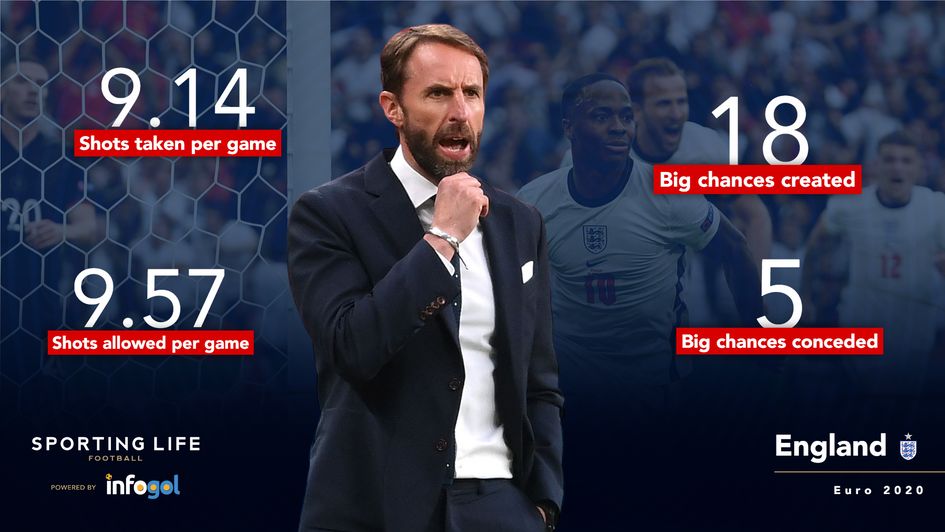Another major tournament cycle ended in heartbreak for England after defeat on penalties to Italy in the Euro 2020 final on Sunday night.
In truth, Italy's win against a tepid England side was wholly justified, completely dominating the game following the early setback that was Luke Shaw's goal.
Calls for Gareth Southgate to be replaced, likely driven by emotion rather than logic, might well be dismissed, but it is valid to question his approach – showing an element of caution that only invited more risk.
Southgate’s caution is miscalculated risk
Southgate held up France and Portugal as examples of “savvy and experienced winners” to his squad prior to the tournament, highlighting solid game management as a big part of their success.
It’s clear England wished to emulate the two most recent major tournament winners in Euro 2020, prioritising clean sheets and a guarded outlook over the possible chaos involved with opening up to a more expansive style of play.
To operate with caution often leads to a risk-averse process, which is wholly accurate when looking at England’s tactical displays throughout the competition. However, the reduction of shots at both ends only serves to raise the variance from a data perspective.

Southgate’s side averaged 9.14 shots taken and 9.57 shots allowed per game during the tournament. Granted, the quality of chances created were far better than the quality of chances conceded, but such an approach does heighten the importance of every action on the pitch.
England’s approach was more suited to a club team chasing domestic glory, a qualifying campaign for an international tournament, maybe even a group stage.
It certainly worked in Group D, as England breezed through to the last 16 after gaining seven points against Croatia, Scotland and Czech Republic, averaging 0.58 expected goals against (xGA) per game en route to keeping three clean sheets.
Those matches did highlight some issues in attack, though, and knockout football is a different animal to group play, often decided by moments.
Fine margins decide 'controlled' matches
A good scoring opportunity missed, a long-range effort scored by the opposition or a single mistake have much more significance in a game of control, making a huge difference in such a low-scoring sport.
England rarely missed excellent chances when they came their way, but we did see the kind of moments that change a tie in an instant in the knockout rounds.
The 2-0 win over Germany encapsulates the problems involved with Southgate’s approach.
Germany missed their first big chance of the game before England scored theirs. Raheem Sterling then made a mistake that almost immediately gifted Thomas Muller a glorious chance to even the score. Ultimately, the two teams finished level on xG, ending the game with a total of 1.33 each. In simpler terms, it was a match that could have gone either way.
(2.69 xG) #ITA 1-1 #ENG (0.75 xG)
— Sporting Life Football & Infogol (@InfogolApp) July 12, 2021
(3.23 xG) #ENG 2-1 #DEN (0.30 xG)
(0.26 xG) #UKR 0-4 #ENG (2.15 xG)
(1.33 xG) #ENG 2-0 #GER (1.33 xG)
(0.46 xG) #CZE 0-1 #ENG (1.13 xG)
(1.67 xG) #ENG 0-0 #SCO (0.73 xG)
(1.50 xG) #ENG 1-0 #CRO (0.54 xG)
🎢 It was some rollercoaster 👇
Alongside the comfortable quarter-final win against Ukraine, the extra-time victory over Denmark gave us a brief glimpse into the possibilities of a more attacking outlook from England.
Once again, a small moment could have altered the outcome if England weren't afforded the opportunity to recover. Mikkel Damsgaard's free-kick (0.04 xG) could have been a hammer blow if Southgate's side continued in the same tepid manner.
Instead, England grew in stature, utilising their depth in forward positions to simply dominate the Danes. Although extra-time was needed, a trip to the final was no more than England deserved, displaying the ability to be solid in defence while creating plenty up top (xG: ENG 3.27 - 0.30 DEN).
Much like the semi-final defeat to Croatia in the 2018 World Cup, England's early goal against Italy allowed them to settle into a conservative role in the match-up, inviting pressure from the best team the Three Lions faced all tournament - pressure that ultimately paid.
England need to move forward
After Southgate based England's approach on them, it is perhaps fitting that France and Portugal were dispatched relatively early in the tournament, a sign of how quickly football moves on.
Make no mistake, evolution is required to make the next step. Fine margins after a privileged run to the final denied England glory, but it's time to widen the margins by being bold.
Italy and Spain, arguably Euro 2020’s two best teams, embraced change. They were brave in going forward, a shift Southgate should make heading into the World Cup.
England need to recognise who they truly are, a powerhouse of attacking talent that 31 teams should fear next November.









